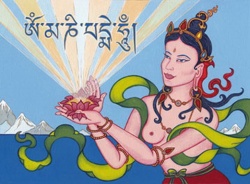Difference between revisions of "Kumarata"
(Created page with " Kumarata 鳩摩羅駄 (n.d.) (Skt; Jpn Kumarada) Also known as Kumaralata or Kumaralabdha. The eighteenth of Shakyamuni's twenty-three, or the n...") |
|||
| Line 1: | Line 1: | ||
| − | + | {{DisplayImages|158}} | |
[[Kumarata]] | [[Kumarata]] | ||
[[鳩摩羅駄]] (n.d.) (Skt; Jpn [[Kumarada]]) | [[鳩摩羅駄]] (n.d.) (Skt; Jpn [[Kumarada]]) | ||
| − | + | Also known as [[Kumaralata]] or [[Kumaralabdha]]. | |
| + | |||
| + | The eighteenth of [[Shakyamuni's]] twenty-three, or the nineteenth of his twenty-four, successors. | ||
| + | |||
| + | According to A [[History of the Buddha's Successors]], he was born in [[Takshashilain]] the north-western part of {{Wiki|ancient India}} and was very [[wise]] even as a child. He became a [[monk]] and is said to have later inherited [[Shakyamuni Buddha's]] teachings from [[Samghayashas]]. | ||
| + | |||
| + | His [[wisdom]] and {{Wiki|scholarship}} were famed throughout [[India]] and attracted numerous [[people]] to [[Buddhism]]. [[Hsüan-tsang's]] [[Record of the Western Regions]] lists [[Kumarata]] as one of the "[[four suns]]," the others being [[Ashvaghosha]], [[Nagarjuna]], and [[Aryadeva]]. | ||
| + | |||
| + | They were called "[[suns]]" because they were considered to [[illuminate]] the [[world]] with [[the light of wisdom]]. | ||
| + | |||
| + | [[Kumarata]] is regarded as the founder of the [[Sautrantika school]]. He transferred the [[Buddha's teachings]] to [[Jayata]]. It is said that he lived near the late third century, but there is no clear {{Wiki|evidence}} confirming that date. | ||
| + | {{R}} | ||
| + | [http://www.sgilibrary.org/search_dict.php?SearchSelect=dict&p=14&m=1&in=2&q=buddha] | ||
| + | [[Category:Chinese Buddhism]] | ||
Latest revision as of 10:46, 21 September 2015
Kumarata 鳩摩羅駄 (n.d.) (Skt; Jpn Kumarada)
Also known as Kumaralata or Kumaralabdha.
The eighteenth of Shakyamuni's twenty-three, or the nineteenth of his twenty-four, successors.
According to A History of the Buddha's Successors, he was born in Takshashilain the north-western part of ancient India and was very wise even as a child. He became a monk and is said to have later inherited Shakyamuni Buddha's teachings from Samghayashas.
His wisdom and scholarship were famed throughout India and attracted numerous people to Buddhism. Hsüan-tsang's Record of the Western Regions lists Kumarata as one of the "four suns," the others being Ashvaghosha, Nagarjuna, and Aryadeva.
They were called "suns" because they were considered to illuminate the world with the light of wisdom.
Kumarata is regarded as the founder of the Sautrantika school. He transferred the Buddha's teachings to Jayata. It is said that he lived near the late third century, but there is no clear evidence confirming that date.
